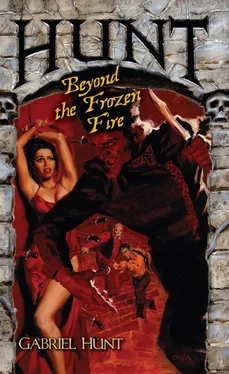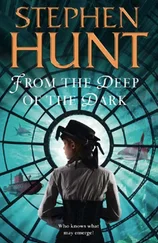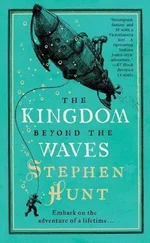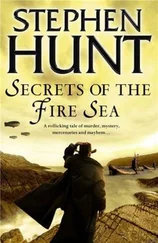Ivory only had eyes for Qingzhao, who was now boxed in near the panoramic windows with no place to run. The blimp cruised past behind her, flashing advertising in polyglot: CortCom. Vivitrac. Eat Nirasawa-Mega-Output Beverage!
Qingzhao brought an entire framework of glass panels down on Ivory’s head. Then she put the rest of her clip into the big curved window, which disassembled itself and succumbed to gravity.
Ivory had her dead in his sights as she jumped. He spent the rest of his clip trying to wing her on the way out.
He ran to the window, icy night air scything inward. From this high up, the light of the Bund made it impossible to see the river. No parachute, no falling body, just blackness.
Qingzhao, Ivory knew, would have counted on that.
Chapter 1
“I give up.”
Gabriel Hunt was widely known for solving mysteries and rising to challenges. This time, however, frustration had bested him.
“I give up. You do it.”
He relinquished the Rubik’s Cube, placing it onto the table (itself a Chinese antique gifted by a beneficiary of a Hunt Foundation grant) next to a more obscure and even more difficult puzzle called the Alexander Star.
“It’s a toy, Gabriel. Children do it.”
“So give it to a child then,” Gabriel said.
Michael picked the cube up, began idly turning its sides. Instead of colors, each square was labeled with a piece of the Hunt Foundation logo against a different metallic background—silver, copper, bronze, gold—and the toy itself was made of stainless steel rather than plastic. “You give up on things too quickly,” he said. In his hands, the facets slowly assembled themselves.
“Name one thing I’ve given up on,” Gabriel said. “Just one. Other than this toy.”
“The Dufresne report.”
“I brought back the mask. Dufresne should be happy.”
“He wants a report.”
“Here’s your report: I brought back the mask, close quotes, signed, Gabriel Hunt. What else does he want to know?”
Michael shook his head. “He has a board of trustees he has to answer to. It’s not enough to hand him a carton and say, here, here’s your mask. That’s not the way things are done in the foundation world. You should know that.”
Why was it that every time Michael opened his mouth, he sounded like he was the older brother rather than the younger? Gabriel was his senior by six years and change.
Michael set down the Rubik’s Cube, its sides neatly arranged, entropy defeated once again.
“Never mind,” he said, heaving a familiar sigh. “I’ll write it.”
“Make it good,” Gabriel said. “Tell them I had to sneak past a tribe of cannibals to get it.”
“In the south of France?”
“Gourmet cannibals.”
“I’d appreciate it, Gabriel, if you could show a modicum of seriousness about these things.”
“I know you would, Michael. It’s what I love about you. You use words like ‘modicum’ with a straight face.”
They were a study in contrast, Gabriel and his brother.
Both were still in tuxedos—how often had that fate befallen them?—the eve ning’s entertainment having consisted of the Hunt Foundation’s annual Martin J. Beresford Memorial Awards dinner two floors below. But where Michael wore his bespoke tailored suit with quiet dignity, Gabriel had untied the bowtie and cummerbund of his rented number and undone the shirt studs halfway down his chest. Michael was scholarly, almost tweedy, bespectacled; the pallor of his skin reflected a life spent largely indoors, these days behind a computer screen much of the time, or else talking on the telephone to similarly pale men halfway around the globe. Gabriel was darker—hair as black as shoe crème, skin browned by the sun of many lands. He was chiseled, the muscles of his long arms ropy. The last time he’d found himself behind a computer he’d been using the thing as a shield. You can’t beat a nice solid IBM laptop for stopping a bullet.
The aegis of the Hunt Foundation had made both brothers moderately famous in their respective ways, and to an extent they depended on one another for their success. Gabriel’s discoveries in the field and unearthments of historical significance would not have been possible without the Foundation’s financial support. Michael, in turn, acknowledged grudgingly that much of the Foundation’s prestige derived from the attention Gabriel’s higher-profile successes had brought in—the kind of risk-taking that is indefensibly reckless until it yields something suitable for publication.
“Your presentation went over well,” Michael said in a conciliatory tone.
“It had pictures. Everyone likes pictures.”
“Oh, you’re in one of your moods ,” Michael said.
“Four hours of speeches from guys in penguin suits will put anyone in a mood. Anyone but you.”
“Maybe so.” Michael sorted through some of the neatly arranged papers on the table, pulled a sheet and turned it to face Gabriel. “Before you go.” He uncapped a fountain pen and held it out. “You still have to cosign the endowment for the Indonesian group.” All significant expenditures of the Hunt Foundation needed to bear the signatures of both brothers, though Michael handled all other aspects of the organization’s administration on his own.
“The Molucca figures,” said Gabriel. “Right.” He reached out for the pen, and at that moment both brothers heard the sound of footsteps outside the office door. The knob turned, the door swung toward them, and a member of the Foundation staff stuck his head inside. “Mr. Hunt?”
“Yes?” Michael said. “What is it, Roger?”
But Roger said, “Not you, sir,” and turned to Gabriel.
“Me?”
“There’s a woman, sir, asking for you. Quite…informally dressed. She insists on speaking with you. I let her know you were occupied with Foundation business, but she insisted she has something of utmost importance to discuss with you…in private, sir.”
“Do you know who this is, Gabriel?” Michael asked. “Some old paramour of yours?”
“Probably,” Gabriel said. “Though how any of them would know to look for me here I don’t know.”
“Possibly your last name on the plaque by the door,” Michael said, “next to the word ‘Foundation,’ had something to do with it.”
“Where is she?” Gabriel asked Roger.
“In the club room, sir.” Roger’s expression was unreadably neutral. He was very good at his job.
Gabriel bent over the Indonesian papers, signed them swiftly in triplicate, re-capped the pen and followed Roger to the door. “Don’t wait up for me,” he told Michael.
“Oh, I know better than that,” Michael said.
As Roger led him down a gently curving and lushly carpeted flight of stairs, Gabriel ran through in his head the women who could possibly have tracked him down here. Annabelle? Rebecca? No; they were both still in Europe and lacked visas to travel to the U.S. Joyce Wingard? Fiona Rush? Unlikely in the former case, strictly impossible in the latter. Then who? He could have continued guessing indefinitely without ever thinking of the woman who turned from the window at the far end of the room to face him after he entered the club room and shut the door behind him.
“Hello, Gabriel.”
“Lucy?”
He saw her bristle at the name.
Lucy Hunt had been born Lucifer Artemis Hunt, thanks to parents whose knowledge of classical antiquity and Biblical scholarship exceeded their ability to anticipate the taunting a girl might be forced to endure from her peers if they named her Lucifer. They’d meant well, naming all three of their children after archangels from the Bible, but Gabriel and Michael had gotten the long end of that particular stick and Lucy the short. When she’d run away from home at age seventeen, her name hadn’t been the cause, or at least not the sole cause—but all the same, she’d taken to calling herself Cifer. She’d also severed all ties to the family, the Foundation, and her prior life. Gabriel had seen her a grand total of two times in the past nine years, neither of them here in the building where they’d grown up; and he knew Michael hadn’t seen her even once. He’d exchanged e-mail with the mysterious “Cifer” from time to time, but had no idea who it really was, because at Lucy’s request Gabriel had never told him.
Читать дальше












